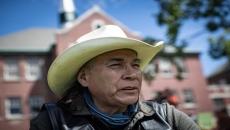Immigration Minister Marco Mendicino says Canada is offering two new paths to permanent residency for Hong Kong residents who work here or are recent graduates already living in the country.
"With young Hong Kongers casting their eyes abroad," Mendicino says in a statement. "We want them to choose Canada."
He says Canada's Hong Kong immigration pathway is a historic initiative, intended to attract talented applicants who will drive the country's economy forward especially as Canada prepares to reopen after the COVID-19 pandemic.
"Skilled Hong Kongers will have a unique opportunity to both develop their careers and help accelerate our recovery," he says.
The ties between 🇨🇦 and 🇭🇰 run deep, and Hong Kongers have made great contributions to 🇨🇦 for more than 150 years!
— Marco Mendicino (@marcomendicino) June 8, 2021
These measures will help us attract young talent - boosting our economy and giving them a chance to build the life they want in Canada. https://t.co/HHcywXv6td
The federal government says it is "deeply concerned" about China’s imposition of a national security law and the "deteriorating" human rights situation in Hong Kong, adding the country stands shoulder to shoulder with the people of Hong Kong.
In June 2020, the Standing Committee of the National People's Congress of China passed the National Security Law for Hong Kong. The law gives China powers to shape life in Hong Kong and criminalizes any act of secession, subversion, terrorism and collusion with foreign forces.
Critics say it infringes on freedom of speech, while China insists it returns stability to Hong Kong. The United Nations Human Rights Office of the High Commissioner repeatedly warned offences such as subversion under the National Security Law are "vague and overly broad, facilitating abusive or arbitrary implementation."
In January after more than 50 people were arrested under the new law, UN human rights office spokeswoman Liz Throssell said, "We call on the authorities to uphold their obligations under the (International Covenant on Civil and Political Rights), and to refrain from using the National Security Law to suppress the rights to freedom of expression, peaceful assembly and association."
The Canadian government has made statements expressing concerns over the arrests of pro-democracy activists and the “deterioration” of the electoral system in Hong Kong.
Mendicino says adding new pathways to permanent residency for Hong Kong residents will "deepen the strong ties between Canada and the people of Hong Kong."
The government announced initiatives to help Hong Kongers come to Canada in November, and the first stream opened for applications in February. The first stream is focused on allowing eligible Hong Kong residents to work in Canada through a three-year open work permit and to apply for permanent residence more quickly.
In order to be eligible for the new permanent residency pathways, applicants must have valid temporary resident status.
They must also meet the specified language, education and work requirements, and must be in Canada when submitting their application and when their permanent residence is granted.
The first of the new streams is for applicants who have obtained a degree, diploma or graduate credential at a post-secondary designated learning institution in Canada in the last three years. They must have done at least 50 per cent of their program while in Canada.
The second is for applicants who have at least one year of full-time work experience or 1,560 hours of part-time work in Canada in the last three years, and must hold a degree, diploma or graduate credential from a post-secondary learning institution in or outside Canada in the last five years.
These new pathways are similar to the new pathway to permanent residency for over 90,000 essential temporary workers and international graduates announced in April.
Alexander Cohen, press secretary to the immigration minister, said in a statement: "In terms of people who've already applied for the 'TR to PR' pathway, they can have two applications in at once." However, he didn’t confirm which way might be faster.
According to the release, the applicants are still subject to Canada’s regular immigration application, screening and admissibility requirements.





